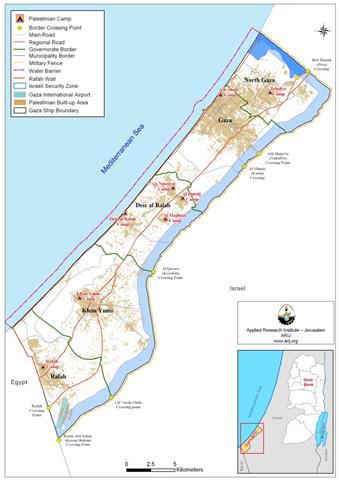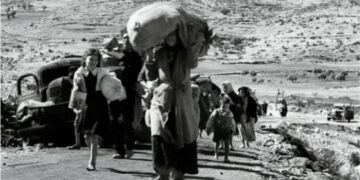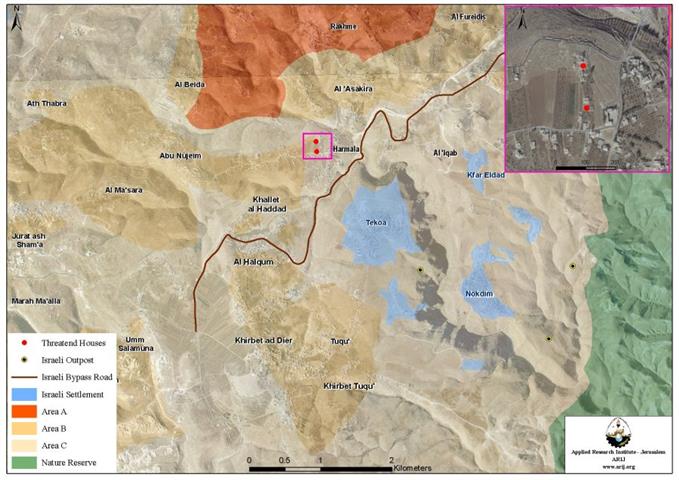Introduction
In a controversial step, the Israeli occupation government declared the four Gazan Terminals linking Gaza Strip with the West Bank and Israel as an International terminals and that the Gaza Strip is a 'Foreign land'. This Israeli announcement maybe interpreted as the Israeli approach to consolidate its occupation over the 17% (61 Km2) of Gaza it still occupys. The Israeli decision went into effect as of February 1, 2007.
The Israeli Interior Minister Ofer Pens officially signed the order on February 14, 2007, alleging that the Gaza Strip is no longer under the Israeli occupation since the unilateral Israeli withdrawal (redeployment) in September 2005.
The four Gaza Terminals that Israel will divert to International Terminals are:
1. Karni Border Terminal
2. Erez Border Terminal
3. Sufa Border Terminal
4. Kerm Shalom Trade Passage.
Double Standard Policy
The Israeli decision to turn four of Gaza�s terminals to international border points serves Israel�s scheme to politically detach its responsibility from the Gaza Strip after 40 years of occupation; even though Israel has not totally relinquish their occupation in Gaza as mentioned earlier with 17% of the land still under occupation. Upon the new Israeli consideration, citizens of Israel and the foreign nationals will need a passport to enter Gaza from Israel using the four terminals without any obstacles. On the other hand, this is not a vice-versa status where Palestinians may enter Israel using their passports, instead, they have to acquire a special Israeli permits from the 'Iraeli Civil Administration', were they most likely will not receive. In other words, the Palestinians will need to get a permit from the Israeli authorities in order to move between the West Bank and Gaza since they will be crossing Israeli controlled territory.
Following the unilateral Israeli pullout (redeployment) from the Gaza Strip in September 2005, it declared the Gaza Strip a foreign territory, and no longer under the Israeli occupation, hence, the crossings between Gaza Strip and the West bank and consequently Israel has been reclassified from crossing points to international borders, a reality that became tangible with the February 14, 2007 official decision, but the evident facts that remains shows that the Gaza Strip is still under a stringent Israeli occupation since Israel control Gaza's land, sea and airspace. See Map 1
Why is Israel still in-control, – occupying Gaza
On the ground, Israel is still occupying the Gaza Strip, especially which it remains in control of:
-
Gaza�s seashores and territorial water: the Israeli Army keeps part of its navy fleet on guard along the Gaza shores around the clock and around the year. Palestinian fish boats are almost entirely denied access to the open sea except when they receive a permit from the Israeli authority of concern. Some 3000 Palestinians in the fishing business has their livelihood threaten because of the Israeli practices, many of whom were fired on, on different occasions. In addition to that, Israel still denies Palestinians their right to construct or establish their own seaport under the pretext of security.
-
Gaza's lands: one of the reasons that the Israeli questionable withdrawal from the Gaza Strip is being identified as redeployment is that Israel maintain what they call a security belt around Gaza's eastern border with Israel, some 61 Km2 or 17% of Gaza's district remains under Israeli occupation, where every access in and out of Gaza is controlled by the Israeli Army.
-
Gaza's Airspace; even though at one time the Palestinians had their own airport, the Israelis went on, destroyed the runways of the airport, and restricted all flying activities. Even more than that, Israel still refuse the Palestinian demand to reconstruct the ruined airport runways or that the Palestinian use it at any time, also under the pretext of security.
-
Gaza's Population Records; Israel still regard the population senses of Gaza its responsibility, as it still pursue any population classification and status and who lives in the Strip and who is not.
-
Gaza's commercial crossings: like the people, Israel still in control of every and/ or any commodities that enters and leaves Gaza in addition to controlling the customs and taxes.
Abstract
It became clear that Israel is not concerned with the international law rules agreements and conventions, and insists on neglecting all the international sounds that calls for the peace in the region, the peace that will not be achieved unless the Palestinian people regain their usurped rights to live in peace, as they should in their homeland Palestine.
The successive Israeli governments as usual disavowed themselves from the agreements signed with the Palestinians. The Israeli decision to divert the four Gazan terminals linking Gaza Strip with Israel to International terminals is definitely illegal and contradicts with Oslo agreement that considered the West Bank and Gaza Strip as a single territorial unit.
Article IV: Council's jurisdiction
Jurisdiction of the Palestinian Council would cover the West Bank and Gaza Strip, except for issues that would be negotiated in the permanent status negotiations. The two sides viewed the West Bank and the Gaza Strip as a single territorial unit.
Prepared by
The Applied Research Institute – Jerusalem
ARIJ













